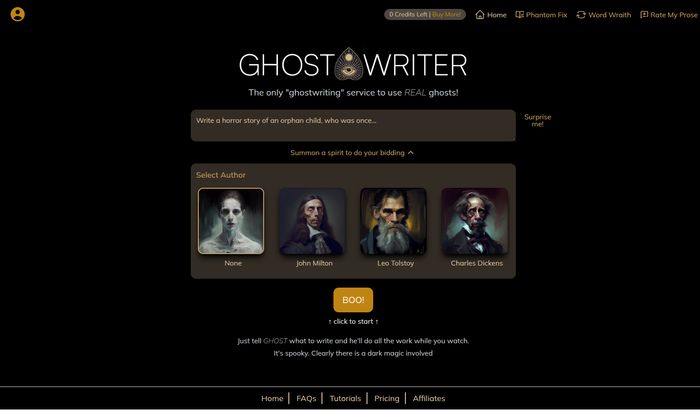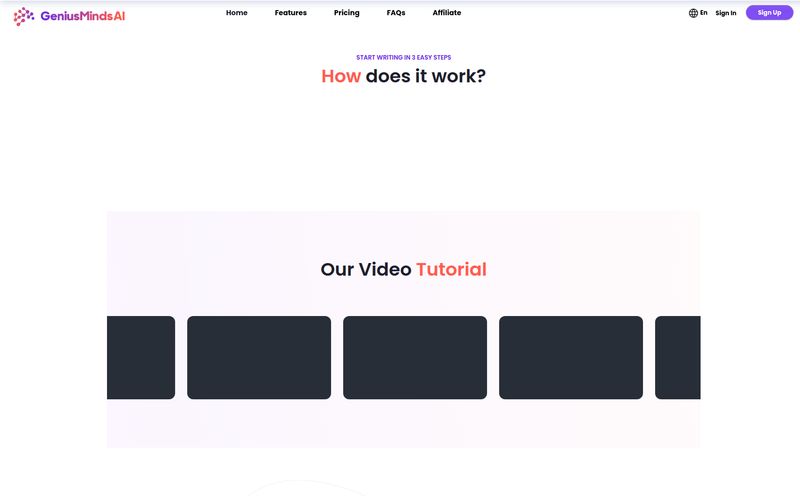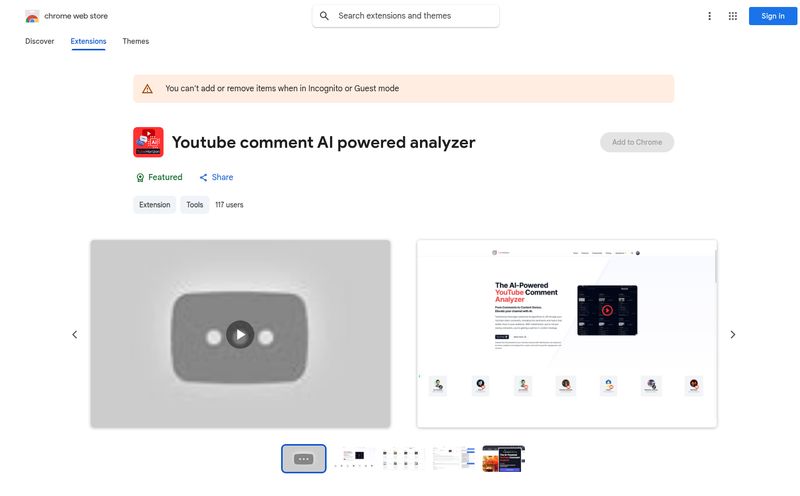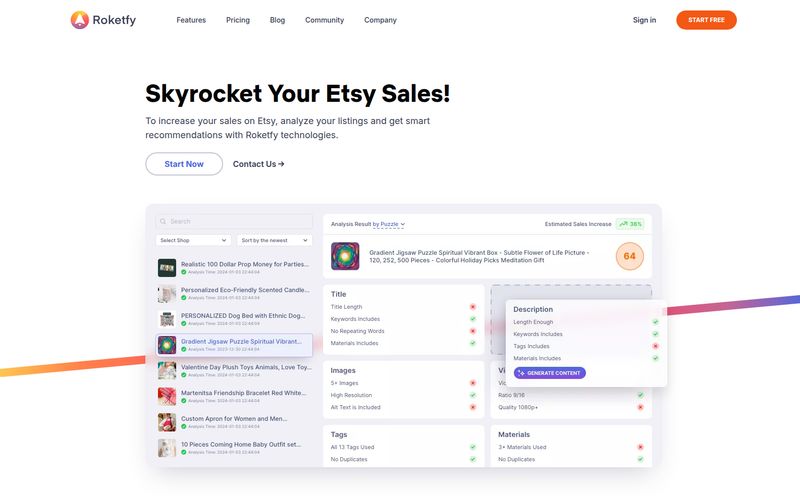I’ve seen a lot in my years poking around the SEO and content creation world. I mean, a lot. From the early days of keyword stuffing (a dark time we don’t speak of) to the current AI content explosion, I feel like I've developed a pretty thick skin. Most new tools are just a rehash of something else with a shinier interface. So when I stumbled upon a tool called Ghostwriter, with its spooky, gothic aesthetic and a tagline that says it uses "REAL ghosts," my cynicism meter went off the charts. But so did my curiosity.
Is this just a clever gimmick wrapped around another GPT-clone, or is there some real magic under the hood? A tool that lets you channel the spirit of Charles Dickens or Leo Tolstoy to write your next blog post? C'mon. It sounds absurd. And yet… I had to try it. So I grabbed my digital candelabra and stepped into the haunted house of Ghostwriter AI.
So, What Exactly Is This Spooky Ghostwriter AI?
At its core, Ghostwriter is an AI writing assistant, but with a fantastic, literary twist. Instead of just giving you a generic AI voice, it lets you "summon a spirit" to do your bidding. You pick a famous author from their library, give them a prompt, and the AI attempts to write in that author's signature style. Think of it as literary ventriloquism.
The whole experience is dripping with theme. The interface is dark, the buttons say things like BOO!, and the pricing tiers have names like Phantom and Poltergeist. Honestly, as a marketing guy, I have to give them props. They picked a lane and floored it. It's memorable, which is more than I can say for 90% of the SaaS tools out there named something like "Contentify.ai".
But here’s the thing that really caught my eye. It’s not just a one-trick pony. When you look past the spooky curtains, you find a full-blown suite of writing tools designed for serious authors and creators. So while you might come for the novelty of making Tolstoy write a horror story, you might just stay for the powerful editing features.
Summoning the Greats: A Walkthrough of the Interface
Getting started is dead simple. Pun intended. The main dashboard is clean, almost minimalist. You’re greeted with a single text box asking you to write what you want. No confusing menus, no endless tutorials. It’s just you, your idea, and a list of literary legends waiting for your command.

Visit Ghostwriting
The process is literally:
- Type your prompt (e.g., "Write about a lonely lighthouse keeper who finds a message in a bottle.")
- Select your author. In the demo, you see titans like John Milton, Leo Tolstoy, and Charles Dickens.
- Click the big yellow "BOO!" button.
That's it. It’s incredibly straightforward. In an industry obsessed with overly complex UIs, this simplicity is a breath of fresh, albeit slightly musty, air. It feels less like operating software and more like playing a creative game.
Beyond Mimicry: The Full Suite of Writing Tools
Okay, writing like Dickens is fun for a laugh. But can it actually help you get work done? This is where I was pleasantly surprised. Ghostwriter isn't just about imitation; it’s a comprehensive platform for improving your writing from start to finish. It’s clear they are targeting novelists and creative writers, not just us content marketers.
Some of the features baked in include:
- Development: It can suggest plot points and ideas to enhance your story. Basically, a brainstorming partner who's read every book ever.
- Dialogue: Helps you write more realistic and engaging conversations between your characters. A godsend for those of us whose characters all sound suspiciously like ourselves.
- Analysis: This is cool. It analyzes your writing style and provides feedback on your narrative voice.
- Proofread & Polish: Your standard grammar and spelling checks, but also features to make your writing more appealing to agents and publishers.
It also has functions for autocomplete, research, and rephrasing. It’s a full toolkit. This discovery shifted my perspective from "this is a fun toy" to "hmm, this could actually be a powerful ally for writers." It's the practical engine humming quietly beneath the spooky, haunted exterior.
The Good, The Bad, and The Ectoplasmic
No tool is perfect, not even one powered by the undead. After spending some time with Ghostwriter, here’s my honest breakdown of where it shines and where the illusion fades a bit.
The Good Stuff
First off, the unique content generation is a huge plus. In a world of generic AI content, the ability to inject a specific, classic style is a game-changer for brand voice or creative projects. It's a fantastic cure for writer's block. Sometimes, just seeing your idea phrased in a completely different style is enough to get your own creative gears turning again. It’s like having a muse in the machine.
The interface is also a major win. It’s easy to use and the themed design makes the whole process more enjoyable. Plus, the different subscription plans mean you can pick a level that fits your budget and word-count needs, which is always appreciated.
The... Not-So-Good Stuff
Now for the reality check. The service runs on credits. You buy a certain number of words per month, and each generation uses them up. I’ve always had a love-hate relationship with credit-based systems. It's predictable for budgeting, sure, but it can also create a sense of scarcity that stifles experimentation. You might hesitate to try a wacky idea because you dont want to 'waste' credits.
Then there's the quality. Like any AI, it can be a bit of a gamble. Sometimes it produces something uncannily brilliant. Other times, the result is a bit... off. It might capture the vocabulary of a classic author but miss the rhythm and soul. You still need a human hand to guide it, to edit its work, and to make sure it doesn’t sound like a parody.
And that leads to the biggest philosophical question: originality. Relying too heavily on an AI, especially one that mimics others, could potentially sand down the edges of your own unique voice. It’s a tool, not a replacement for talent. It's something every writer using these tools needs to be mindful of.
Let's Talk Turkey... Or, Ghosts: Ghostwriter Pricing
So, how much does it cost to hire these literary spirits? The pricing is structured in three monthly tiers, clearly designed for different types of users. And yes, they offer a 50% discount if you pay yearly, which is pretty standard stuff.
| Plan Name | Price/Month | Word Count | Best For |
|---|---|---|---|
| Phantom | $15 | 30,000 words | Hobbyists, students, or writers who need occasional inspiration. |
| Banshee | $25 | 100,000 words | Serious novelists, bloggers, and freelance writers. |
| Poltergeist | $45 | 300,000 words | Power users, content agencies, or authors working on multiple projects. |
My take? The pricing is competitive, especially for the features you get. The Banshee plan at $25 for 100k words feels like the sweet spot for most dedicated writers. It’s enough words to make real progress on a manuscript without breaking the bank.
Is Ghostwriter the Right Co-pilot For Your Writing?
Here’s the bottom line. This tool isn't for everyone. If you're an SEO just trying to pump out 10 listicles a day about the "Best Dog Food for Golden Retrievers," this is probably overkill. There are other tools more suited for that kind of bulk work.
But if you're a novelist, a short story writer, a poet, or even a marketer trying to build a brand with a deeply literary and unique voice, then Ghostwriter is absolutely worth a look. The testimonial on their site says it's "the best AI software for novelists out there," and I can see why they'd make that claim. The entire feature set, from plot development to dialogue assistance, is tailor-made for storytellers.
It exists in that fascinating space between tool and partner. It can help you break through creative blocks, experiment with style, and polish your work in ways that a simple grammar checker never could. You just have to be the one holding the reins, guiding the spirit, and making sure your own voice is the one that ultimately shines through.
My Final Verdict
I came in a skeptic, and I'm walking away… intrigued. Impressed, even. Ghostwriter AI managed to do something rare: it surprised me. It takes a fun, gimmicky concept—writing with the ghosts of famous authors—and backs it up with a genuinely useful set of tools for creative writers.
It’s not going to write your magnum opus for you. Thank goodness. But it might just be the quirky, inspiring, and surprisingly powerful muse you need to get you unstuck. For creative writers who are open to having an AI co-pilot, Ghostwriter is one of the most interesting options on the market today.
Frequently Asked Questions
- Can I really write a whole book with Ghostwriter AI?
- You could certainly use it to help you write a whole book. Its features for plot development, character dialogue, and analysis are designed for long-form projects. However, it should be seen as an assistant, not the author. You'll still need to do the heavy lifting of editing, guiding the story, and adding your own human touch.
- Is the content generated by Ghostwriter plagiarism-free?
- Generally, AI-generated content is original in its composition. Ghostwriter creates new sentences based on patterns, it doesn't copy and paste from its training data. That said, it's always a good practice, especially in professional or academic contexts, to run the final text through a plagiarism checker just to be safe.
- How does the credit system work?
- Your subscription plan gives you a certain number of words per month (e.g., 100,000 on the Banshee plan). Every time you generate text, the number of words created is deducted from your monthly total. The words reset at the start of your next billing cycle.
- Is there a free trial?
- Yes! According to their website, they let you "try out of five credits. It's on the house." This gives you a chance to test the interface and see the quality of the output before committing to a paid plan.
- Which authors can Ghostwriter mimic?
- The authors shown on the homepage are John Milton, Leo Tolstoy, and Charles Dickens. However, AI platforms like this often expand their libraries, so it's best to check their site for the most up-to-date list of available "spirits."
- Who is Ghostwriter AI best for?
- It's primarily built for creative writers—novelists, short story authors, and poets. It could also be very useful for marketers or copywriters who want to create content with a very specific, classic, or literary tone that stands out from typical corporate-speak.
Reference and Sources
- Ghostwriter Official Website
- Ghostwriter Pricing Page
- For further reading on the topic, check out The Verge's article on how authors are using AI as a creative partner.



